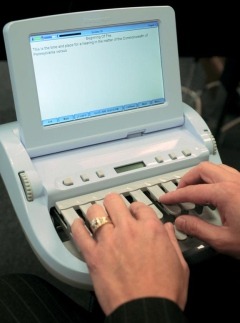 The Good
The Good
According to an article in the Wisconsin Law Journal, “A party who wants to review the transcript of his deposition has to buy it, or review it at the court reporter’s office. He can’t force the court reporter to send him a copy, free of charge.” Read the full article here.
It further states that since court reporters are entitled to reasonable charges when providing copies of a transcript to any party or deponent. “Requiring a court reporter to mail a free copy would undermine that right.” Amen!
The New
Redaction…again. Redaction seems to be a hot blog topic these days. The literal definition of redaction is “The act or process of editing or revising a piece of writing”. Many different fields of interest use redaction every day. But when it comes to the courtroom and reporting, well, it can be expensive and time consuming when it goes right. Get it wrong and it’s even more expensive and time consuming.
Effective October 1, 2010 some new laws were put in place to alter the way confidential information is treated in the public record. We posted a blog in early October about the new law and the 19 items that are considered confidential. The new law mandates that a form is to be filed that lists what is not to be put in the record. This form, which must accompany any court filing, is to help the clerk identify confidential matters and ensure that it doesn’t get into the public records. Hopefully this has helped cut down on the requests to redact information “after the fact”. Time will tell. According to the Florida Bar News, a factor in creating this new law is “the coming electronic revolution in the courts, which includes electronic recordkeeping and public access, as well as electronic filing.”
But, as we all know, the confidentiality issue is just one facet of redaction.
There’s another side of redaction – read the blog “Have You Told Your Court Reporter Lately That You Love Her?”. One paragraph in particular really sums up the other side of redaction – overuse and abuse. “Court reporters are busy and transcripts are required quickly in some cases. The allowing of redactions at any point in time would put a huge burden on the reporter – in both time and money.”
 The Technical
The Technical
An Adobe Acrobat blog sums it up eloquently quoting Kim Walker: “Back in the day, redacting was a breeze. You had a black magic marker, you drew over what you didn’t want your adversary to see and the worst that could happen was you dropped a black magic marker on your tan pants and ruined them. A small price to pay….”. Truer words were never spoken! Now, you think you purged information, but you may have merely just covered it up. And, it can be retrieved – that’s the beauty (or the beast) of digital documents. The blog has links to some great cases of redaction that went horribly wrong including the trial of former Illiniois Governor Rod Blagojevich, HSBC Bank (exposing sensitive bankruptcy data), and TSA (airport security screening leaks).
Read Kim Walker’s full blog that talks about common redaction errors in both Adobe Acrobat and Microsoft Word and walks you through how to avoid them.
We’ll devote a future blog to digital redaction errors and fixes specifically for the legal community soon. In the meantime, as always, please send us your redaction stories so that we can share them with our readers!
